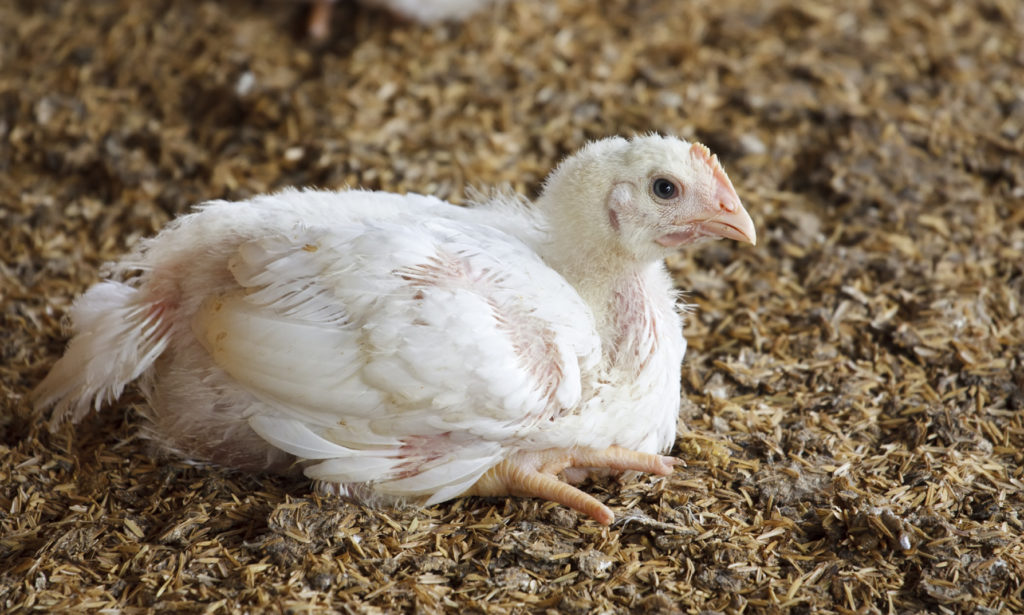Il Partito per gli Animali chiede a Bruxelles un divieto totale del veleno fipronil
La Commissione europea deve interamente abolire il veleno fipronil, trovato su larga scala nelle uova, dall’agricoltura in Europa. Anja Hazekamp, parlamentare europeo a nome del partito per gli animali, ne ha fatto una richiesta una richiesta a Bruxelles durante un dibattito sulla crisi del fipronil.
Fipronil non può essere utilizzato negli animali nella catena alimentare nell’UE, ma è legalmente disponibile. Il veleno è ancora permesso per l’uso in coltivazione. “Fipronil è liberamente in vendita in Europa e può essere facilmente sfruttato per scopi dannosi. E di conseguenza, uova avvelenate nei supermercati e sui nostri piatti. Un divieto totale è più sicuro per la salute umana e animale e meglio per il nostro ambiente”, dice Hazekamp.

Pollo dall’industria del pollame
Le norme dell’UE gravemente violate
Il Partito per gli Animali sottolinea che il benessere di centinaia di migliaia di galline ovaiole trattate con fipronil ed ucciso lo scorso mese nei Paesi Bassi non è stato considerato in un modo responsabile. Secondo Hazekamp le uccisioni erano una violazione delle norme comunitarie per la protezione degli animali e quindi illegali. “Queste galline non erano malate e non erano un pericolo per la salute pubblica. Ci sono stati inflitti inutili dolori, sofferenze e lesioni ai polli, il che sono delle violazioni della legislazione europea. Voglio sapere come la Commissione europea impedirà che queste pratiche avvengano in futuro”, ha dichiarato Hazekamp.
Il Partito per gli Animali vede nella crisi del fipronil l’evidenza che le norme europee sul benessere degli animali e sulla sicurezza alimentare non sono rispettate e che il controllo è spesso assente. “È stato dimostrato nuovamente che il nostro sistema agricolo è insostenibile, ma provvedo che la Commissione europea abbia bisogno di ancora molti altri scandali per trarre la stessa conclusione”, ha detto Anja Hazekamp.
Contesto
Nel mese di luglio, il veleno fipronil è stato scoperto nelle uova nei Paesi Bassi e nel Belgio, e successivamente anche le uova provenienti da altri paesi europei sono state trovate contaminate. Inoltre anche alcuni vitelli sono stati in contatto con un simile veleno chiamato amitraz. Molte uova e prodotti contenenti delle uova sono stati ritirati dai scaffali dei supermercati, perché costituiscono una minaccia per la salute pubblica. In risposta a questi scandali, il Partito per gli Animali ha richiamato il parlamento dalla vacanza estiva per un dibattito. Il governo olandese ha nel frattempo ordinato un’indagine sullo scandalo delle uova.
During a debate on the fipronil scandal, Party for the Animals MEP Anja Hazekamp has called on the European Commission in Brussels to ban the insecticide fipronil, found in vast quantities of eggs, completely from European agriculture.
In the EU, fipronil cannot be used on animals destined for human consumption, but it is legally available and authorised for use in arable farming. “Fipronil is freely available in Europe, and can therefore easily be used for inappropriate ends, leading to contaminated eggs ending up on supermarket shelves and our plates. A total ban will be safer for human and animal health and the environment,” said Hazekamp.

A chicken in the poultry industry
Crude violation of EU rules
In addition, the Party for the Animals points out that there has been insufficient regard for the welfare of the hundreds of thousands of laying hens treated with fipronil, which were slaughtered in the Netherlands last month. According to Hazekamp, these killings were in violation of EU rules on the protection of animals, and therefore illegal. “These chickens were neither ill nor a threat to public health. Pain, suffering and injury were unnecessarily inflicted on chickens, which is at odds with European legislation. I would like to know how the European Commission is planning to avoid such practices in the future.”
To the Party for the Animals, the fipronil scandal is further proof that European rules for animal welfare and food safety are not complied with, and that there is hardly any monitoring. According to Hazekamp, the scandal has once again demonstrated the unsustainability of the Dutch agricultural system, but she expects the European Commission to “need many more scandals before coming to the same conclusion”.
Background
In July of this year, eggs tested in Belgium and the Netherlands were found to contain levels of the toxic insecticide fipronil. Soon after, eggs in other European countries also turned out to be contaminated. In addition, it came to light that some calves had been in contact with a similar pesticide, called amitraz. Many eggs and egg products were removed from supermarket shelves because they presented a public health risk. Following these scandals, the Party for the Animals called for the Dutch Lower House to return early from Summer recess for a debate on the subject. The Dutch government has launched an enquiry into the egg scandal.